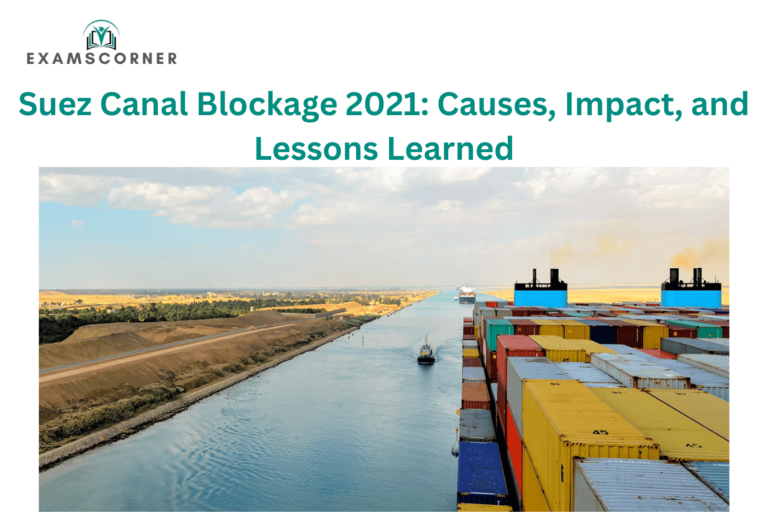In March 2021, the Suez Canal, one of the world’s most critical shipping lanes, faced an unprecedented blockage caused by the massive 20,000 TEU container ship Ever Given. This incident significantly disrupted international trade between Europe, Asia, and the Middle East, highlighting vulnerabilities in global supply chains.
Background of the Event
The Suez Canal is one of the busiest and most crucial shipping lanes globally, facilitating approximately 12% of total global trade. As of 2021, nearly 50 ships transited the canal daily. Despite expansion efforts, most of the canal remains a single-lane route, increasing the risk of such blockages.
The Ever Given, owned by Shoei Kisen Kaisha (a subsidiary of the Japanese Imabari Shipbuilding company), is operated by Evergreen Marine, a Taiwan-based company, and managed by Bernhard Schulte Shipmanagement.
Timeline of the Incident
- March 23, 2021: The Ever Given was traveling through the canal as part of a 15-ship convoy from Tanjung Pelepas, Malaysia, to Rotterdam, Netherlands. A sandstorm caused the vessel to lose steering control, leading it to run aground and block the canal.
- Over 300 vessels were left stranded at both ends of the canal, including container ships, bulk carriers, and oil tankers, representing approximately 16.9 million tonnes of deadweight.
Efforts to Free the Suez Canal Blockage
Salvage operations were carried out with significant international support and coordination. Below is a timeline of the efforts:
- Initial Steps:
- Vessels behind the Ever Given were moved to create space for salvage operations.
- Excavators were deployed to dig out the bow, while fuel and ballast water were removed to lighten the ship.
- March 25:
- The Suez Canal Authority (SCA) suspended navigation until the vessel could be refloated.
- March 26:
- The SCA accepted assistance from the United States Navy dredging experts.
- March 27:
- Fourteen tugboats attempted to leverage the high tide, with additional equipment on standby.
- March 28:
- Initial dislodgement allowed slight movement of the ship’s stern and rudder.
- March 29:
- The stern was refloated at 04:30 local time, aided by an Italian tugboat, Carlo Magno. The canal was declared unblocked shortly after.
- Post-Resolution:
- On April 13, 2021, the vessel was impounded by the Egyptian government due to a reported $916 million in fees, including $300 million for “loss of reputation.”
Impact of the Suez Canal Blockage
The blockage of the Suez Canal had far-reaching consequences, particularly for global trade and supply chains:
1. Global Trade Disruptions
- The incident delayed shipments of essential goods, worsening shortages in industries already impacted by the COVID-19 pandemic, such as the semiconductor sector.
- Alternative routes, such as the Cape of Good Hope, added approximately two weeks to shipping times, increasing costs and delaying deliveries.
2. Supply Chain Vulnerabilities
- The event exposed the fragility of “just-in-time” manufacturing systems, which rely on the timely arrival of raw materials and components.
- Consultants highlighted the potential for a domino effect lasting several months across supply chains.
3. Rising Costs
- Freight forwarders reported increased demand for alternative transportation methods, causing higher freight rates, particularly affecting small and medium-sized exporters.
- Indian exporters faced significant challenges in securing shipments to Europe and Africa.
4. Geopolitical Implications
- Russia used the incident to promote its Arctic shipping routes as a shorter and more reliable alternative to the Suez Canal.
Lessons Learned and Future Considerations
The Ever Given incident underlined the importance of strengthening global supply chain resilience and modernizing critical maritime infrastructure. Key takeaways include:
- Enhanced Salvage Capabilities:
- The challenges of freeing larger vessels emphasize the need for more advanced equipment and coordinated response plans.
- Improved Infrastructure:
- Continued expansion and modernization of the Suez Canal, including additional lanes, can help mitigate risks of future blockages.
- Strategic Planning:
- Businesses may need to diversify supply chains and explore alternative routes to minimize risks from similar disruptions.
- Policy and Governance:
- Governments and international organizations must work together to develop contingency plans for such global trade disruptions.
Conclusion
The 2021 Suez Canal blockage by the Ever Given will be remembered as a pivotal moment in maritime history. While the incident exposed vulnerabilities in global trade, it also served as a wake-up call to invest in resilient infrastructure, robust supply chains, and international collaboration. As the world moves forward, lessons from this event will shape future policies and strategies in global commerce and logistics.



